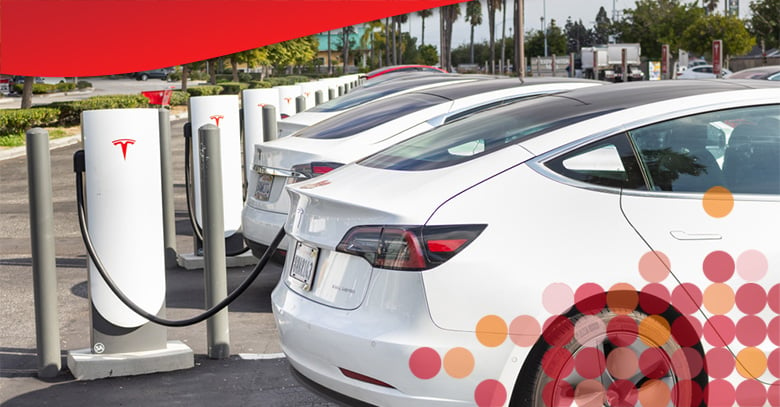As the push for sustainability gains momentum, many businesses and organizations are turning to electric vehicles (EVs) to reduce their carbon footprint. While EVs offer several well-known benefits, such as lower operating costs and improved environmental performance, they will also introduce unique operational challenges.
In this article, we will explore some of the main operational challenges associated with operating an EV fleet, including driver safety, data management, and the need for ongoing driver training and support. We will also discuss some misconceptions surrounding EVs and provide practical tips for managing these challenges effectively.
Common Operational EV Fleet Challenges
We've provided a brief overview of some of the most common operational challenges that fleet organizations experience while converting to EV cars and possible solutions to each challenge, listed below.
It’s important to note that an organization will require unique solutions and approaches to meet its specific needs.
|
|
|
|
|
Charging Infrastructure |
An enterprise must acquire the appropriate charging infrastructure, which may be costly and complex. |
Perform a thorough analysis of your organization's charging requirements. Pursue government incentives and partnerships for funding, and work with a qualified infrastructure supplier. |
|
Driver Training |
EVs require different driving behaviors and charging practices than conventional vehicles. |
Deploy an AI-powered automated system to provide ongoing training opportunities across your fleet on proper charging practices, safe driving techniques, and EV-specific maintenance requirements. |
|
Data Management |
Data collection and analysis from electric vehicle fleets can be challenging, especially when working with multiple disparate solutions and legacy systems. |
Use an AI-powered automated system to integrate your solutions and monitor, analyze, and take automated action to improve real-time fleet performance. |
|
Range Anxiety |
Because EVs have a shorter range than conventional vehicles, they can introduce range anxiety. |
Plan routes and charging schedules, and deploy an automated mobile workforce solution to help you manage range and efficiency issues and educate drivers on range management techniques. |
|
M&R Issues |
EV maintenance and repairs may require specialized knowledge and equipment. |
Partner with experienced EV mechanics and invest in training for internal staff |
Q&A: Discussing Common Misconceptions About EVs
It's easy to assume that switching to electric vehicles solves all operational issues, but this isn't the case. While EVs offer numerous benefits, it's important to remember that driver behavior still plays a critical role in reducing risks and maximizing efficiency and performance.
At Tourmo, we've identified some common misconceptions surrounding EV adoption that are worth exploring further. By addressing these misconceptions, fleet managers can ensure a smooth and successful transition to EVs.
1. Do I still need a driver behavior solution after moving to EVs?
Yes. Although EVs may be more technologically advanced than ICEVs they still pose safety concerns due to driver behavior. Even with features like ADAS, cameras, and radar, risky driving behaviors can still occur, especially during the adjustment period when drivers are getting used to the faster acceleration and instant torque of EVs.
To ensure driver safety, companies working with EVs should prioritize ongoing training opportunities and consider implementing an advanced driver behavior solution. That solution could address specific risky behaviors, including distracted driving, aggressive driving, and speeding.
While cost and implementation may be potential concerns, the benefits of a driver behavior solution in driver safety and reduced liability create net value for the program. And companies will continue to face many of the same safety issues they did before transitioning to EVs. Therefore, it's crucial to acknowledge the risks and take proactive steps to address them through a driver behavior solution.
2. Do I still need to worry about fuel efficiency with EVs?
Yes. Fuel efficiency remains a relevant concern with EVs, and it's essential for companies adopting these vehicles to prioritize range optimization to minimize range anxiety. Understanding how energy consumption works with EVs is necessary to accomplish this goal.
To achieve optimal fuel efficiency with EVs, companies should implement an active efficiency program that promotes fuel-efficient driving habits, such as slower acceleration, avoiding rapid braking, and maintaining a consistent speed.
Research has shown that aggressive driving can lower EV efficiency by up to 30%. The same driving habits that consume more fossil fuels also use more electricity. An efficiency program that encourages steady driving can maximize range and efficiency, ultimately reducing expenses.
Electricity is another fuel type, and companies will need to monitor costs and increase margins, even though it's typically cheaper per mile than fossil fuels in most parts of the country. While companies will initially see cost savings, keeping expenses low will require monitoring the electricity and range of an EV fleet.
3. Should I worry about emissions tracking and reporting if I move to EV?
When transitioning to EVs, emissions reporting is still important to factor in, even though EVs emit no tailpipe emissions. One main reason for this is that the transition to EVs will likely happen gradually, meaning that companies will still need to manage the emissions and efficiency of their existing ICEVs during this period, which can span years.
Another reason emissions reporting is essential is that EV charging requires energy, and the emissions associated with this energy regeneration must be considered. Reporting on indirect emissions related to EV charging and energy consumption may be necessary.
As previously mentioned, adopting new EV vehicles will require special handling and management to optimize their efficiency and range. Thus making monitoring driving behavior and emissions reporting a valuable tool for tracking progress and identifying areas for improvement. While EVs offer many benefits, emissions reporting will remain important for existing ICEVs and EV charging.

Tourmo’s AI-Powered Driving Behavior Solution
Managing risk and efficiency is essential for any fleet and becomes even more critical during the transition to EVs. Drivers new to EVs may have a different risk profile due to these vehicles' unique handling characteristics, including fast acceleration and instant torque. As a result, implementing an actively managed safety program that offers automated feedback and active coaching to minimize risk and efficiency concerns associated with EV vehicles.
Tourmo can make the transition to electric vehicles more manageable and successful. Our AI-powered mobile workforce solution provides real-time data on vehicles, driving behavior, and risk. Our patented technology allows users to monitor and address risky driving behavior in real time, and gamification encourages driver participation.
When Tourmo’s automated exception-based management system detects a pattern of unsafe driving behavior, it will contact a supervisor for further assistance.
A few example benefits of using the Tourmo Driving Behavior product include:
- Up to 25% fewer accidents
- Up to 10% reduction in insurance premiums
- Up to 10% reduction in fuel and/or maintenance costs
- Up to 50% increase in driver engagement and satisfaction
- Increase in driver retention
Overcome EV Fleet Challenges With Tourmo AI
Tourmo can assist your enterprise organization if it is currently transitioning to electric vehicles and is concerned about optimizing your fleet's safety, efficiency, and productivity. Our AI-powered platform is designed to help organizations transition to electric vehicles as smoothly as possible, reaping the benefits of lower costs, fewer accidents, and higher driver engagement.
With our patented technology, you can maximize your existing tech stack investment and achieve the highest ROI possible with no rip-and-replace involved. Further, our system provides drivers with automated feedback and coaching, reducing the risk of accidents and liability. Join the growing number of fleet enterprises that rely on Tourmo for their electric vehicle needs!


 Neil Anderson, CMO
Neil Anderson, CMO




